
Publications
Photo Credit (top image): Chris Henry / Unsplash
MIC Publications
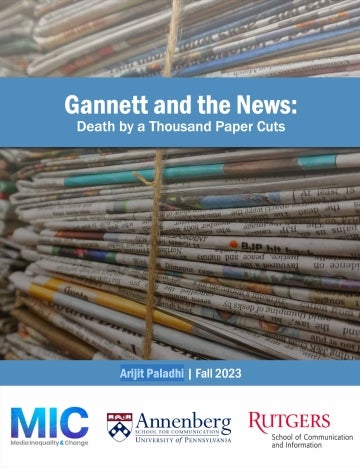
Author: Arijit Paladhi
This report examines Gannett, the largest newspaper chain in the United States, and its significant influence on local journalism, democracy, and its workforce. It critically dissects Gannett’s mergers and labor policies, showing how profit-driven motives lead to news standardization and jeopardizes the press’s role as well as its democratic duties. The analysis explores the erosion of local news, the consequences of Gannett’s financial tactics on journalistic integrity, and the company’s internal inequities. The paper concludes with a call for action to safeguard local journalism’s vital role in democracy.
This report maps the emergence of a new consensus regarding the impact of social media on democracy at the 2023 Milton Wolf Seminar on Media and Diplomacy.
Based on interviews with seminar organizers and an analysis of other primary sources, MIC Postdoctoral Fellow David Elliot Berman argues that seminar attendees in the early 2010s generally saw social media platforms as a beacon of liberal internationalism and as natural adversaries of authoritarianism. In contrast, more recent seminars have emphasized the structural challenges posed to democracies by platforms. As we approach a “post-neoliberal” moment in global governance, recent seminars have featured renewed calls for state regulation of social media companies to mitigate the various threats posed to the international order by platforms.

In 2020, racial justice took center stage in U.S. public discourse as massive numbers of people took to the streets to protest police brutality and systemic racism in policing and in American society more broadly. Triggered by the killing of George Floyd in May 2020, the protests demanded accountability for Floyd’s death and for the many other Black people killed by police. In this context, many news organizations were confronted with their own history of institutionalized racism, including scrutiny around how newsrooms cover policing, race, and communities of color.
This study explores whether and how the heightened public discourse on racial justice potentially influenced reporting on policing in 2020. Based on a content analysis of a full year’s coverage of policing by the Minneapolis Star-Tribune, the Louisville Courier-Journal, and the Philadelphia Inquirer – each of which witnessed a local high-profile case of police killing a Black person in 2020 – we assess how sourcing practices, portrayals of the police and civilians, and the presence of contextual information help shape readers’ understanding of policing.
Read "Policing 2020: Local news reporting during a year of racial justice protests"

This report examines Blockchains, LLC’s ambitions in Nevada to build a modern-day self-governed cryptocurrency company town, subsidized by the state on nearly every level. By looking at the state’s mining history, and Tesla’s Gigafactory, Nevada’s giveaways to Blockchains, LLC can be understood through its longstanding practice of giveaways of land and other natural resources while simultaneously ignoring poor labor conditions. The report also assesses how big tech converges with a burgeoning Tech labor rebellion, contending with issues of worker surveillance and mechanization.
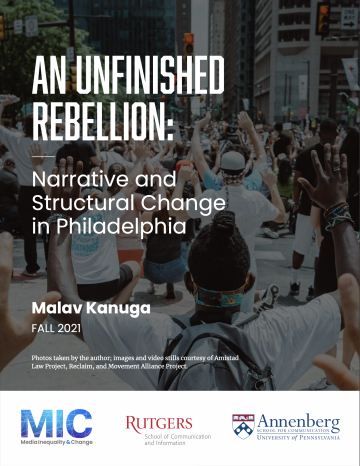
“An Unfinished Rebellion” analyzes narrative and media-based organizing in Philadelphia around issues of policing and public safety in the wake of the 2020 protests following the murder of George Floyd and Breonna Taylor. The report describes coordinated initiatives around community narrative power as an integral part of existing and emerging citywide coalitions. It also highlights the significance of narrative power for broader social movements formations in the context of a series of crisis facing everyday Philadelphians, and concludes with a call for mass organization that can shift the narratives presently governing the city and society.
Read "An Unfinished Rebellion: Narrative and Structural Change in Philadelphia"
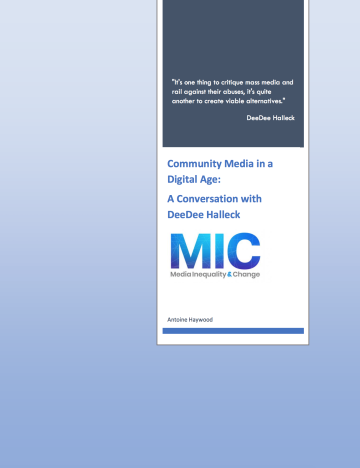
In July 2007, I attended my second Alliance for Community Media (ACM) national conference. While many community access television practitioners at this convening were fretting implications of, then, newly enacted statewide video franchise statues, all I wanted to do was talk shop about youth media. Fortunately, somewhere in the weeds of jittery talk about shifting cable franchise fee structures, I managed to cross paths with a kindred spirit who turned out to be pioneer media activist DeeDee Halleck.
Read "Community Media in a Digital Age: A Conversation with DeeDee Halleck"

This report examines the relationship between the health of a local news ecosystem and the precarity felt by individual news workers in Philadelphia and Cincinnati. We identify trends in each market, as well as the major media institutions with the goal of identifying the specific opportunities and conditions our interview respondents navigate. Second, we interview early career journalists in both cities, who have worked in Cincinnati or Philadelphia for between two and 10 years, what we call the “postcrisis” generation. They came from a mix of organizations: legacy newspapers, radio, and television stations, public and commercial media, as well as a range of digital startups funded with both private and philanthropic dollars. The interviews illustrate the ways in which individuals make sense of the conditions that surround them, the strategies they use to navigate those conditions, and the decisions they make, or, in many cases, feel like they have no choice but to make. The report concludes with recommendations, tangible and specific, for funders, the news industry, journalism schools, and students and early-career journalists.
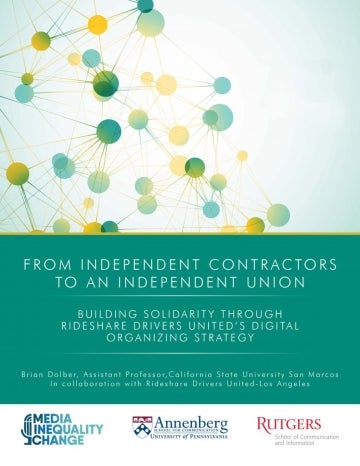
This report explores the viability of using social media and app-based organizing tools in building democratic gig worker organizations. The author partnered with Rideshare Drivers United-Los Angeles, a democratic and independent association of US rideshare drivers seeking fair pay, transparency, a voice on the job, and community standards in the rideshare industry. With limited resources and volunteer labor, RDU was able to leverage the low cost of social media advertising, and, through app-based technologies and SMS, develop a hybrid online-offline model of organizing. The success of RDU’s campaign demonstrates that such a model can help overcome the obstacles endemic to building a democratic organization of a massive, unidentified, disaggregated, and fluid workforce that can exercise real power.
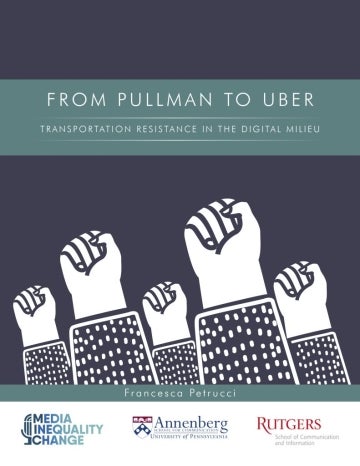
This piece takes a historical view of labor struggles and the law to shed light on the fight of gig workers from Uber to GrubHub today. Through analysis of the Pullman strike and the broader struggle of railway workers in the 19th century, Francesca Petrucci clarifies what is new and old in the contemporary struggle around workers’ rights in the platform economy and is part of MIC’s series on the future of work.
Read "From Pullman to Uber: Transportation Resistance in the Digital Milieu"

The City of Philadelphia has a transparency problem impacting its newsrooms. Many studies have overlooked the ways in which Pennsylvania’s Freedom of Information (FOI) laws constrain and empower local media practitioners. To fill in this major gap in scholarship, between October 2018 and January 2019, we conducted 17 interviews with Pennsylvania-based journalists in order to highlight their experiences with Pennsylvania’s Right to Know (RTK) law. This report considers the results that their records requests have yielded and includes a comparative assessment of the RTK law as a mechanism of transparency and accountability. With special consideration to the difficulties that journalists face when they encounter resistance from open-records officers, we ask how journalists telling stories in and around Philadelphia can more effectively optimize the resource of public information in service of investigative reporting. We close by recommending a series of industry and policy reforms in order to ensure its future as a powerful investigative tool in Philadelphia’s newsrooms. This research was co-funded by MIC and the Center for Media at Risk as part of a series on the future of journalism.
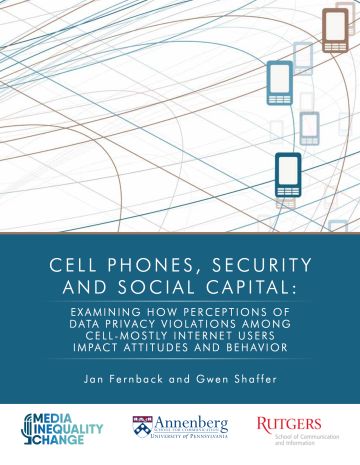
This research highlights the intersection between emerging forms of digital inequity and long-standing socio-economic injustices. The authors illustrate how low-income Americans who rely on smartphones to access the internet are aware of frequent surveillance by corporations, social media platforms and the government. In an effort to maintain data privacy, they sometimes modify online activities in ways that harm personal relationships and force them to forego professional opportunities. Study participants, generally, seemed resigned to their status as having little power and minimal social capital.Read "Cell Phones, Security, and Social Capital: Examining How Perceptions of Data Privacy Violations Among Cell-Mostly Internet Users Impact Attitudes and Behavior"

Powerful new digital technologies are remaking our economy and could help the City of Philadelphia (and other cities like it) improve quality of life, effectiveness of services and address critical problems of inequality. None of this will happen, however, without thoughtful policy. This report summarizes the Platform Economy and the Future of the City Convening held at Philadelphia’s City Hall and at the University of Pennsylvania, hosted by the Media, Inequality & Change Center. This convening brought together innovative thinkers from around the US and Europe and local organizers, academics, policymakers and workers in the Platform Economy. During the 2-day event, participants discussed how Philadelphia can maximize the benefits of the Platform Economy for all and the intense, productive conversations identified key challenges and opportunities, and makes recommendations.
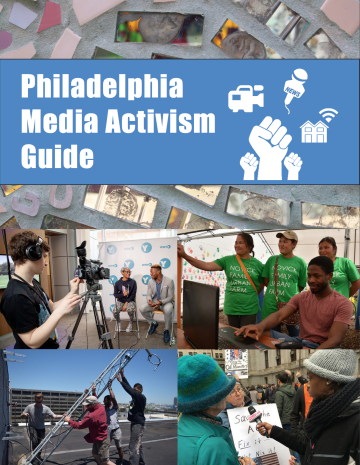
Philadelphia is regarded popularly as a city of neighborhoods that are defined by their eclectic identities. This guide features a constellation of Philadelphia-based organizations that use media-making as a means to empower marginalized communities, amplify untold stories, and advance social equity. This living document is meant to be a resource for academics, educators, funders, artists, and community organizers who aspire to forge partnerships and leverage communal assets. Ultimately, we hope this guide will inspire continued growth in Philadelphia’s thriving public-interest media ecosystem.
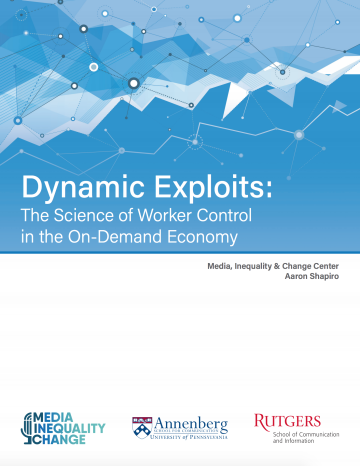
On-demand service platforms (e.g., Uber, Lyft, Postmates and Caviar) recruit workers by promising on-the-job flexibility. Flexibility, however, is equally important to the firm: it justifies their classification of workers as independent contractors rather than employees. This designation has obvious financial benefits for companies, but it also introduces new challenges when workers’ decisions run counter to the firm’s needs. On-demand firms thus develop covert strategies to influence workers’ decision-making such that their choices conform to company interests.
The most prominent of these control strategies involve dynamic pricing and dynamic wages. Understanding how such strategies work, however, is quite difficult; on-demand firms are notoriously opaque about their policies. To cut through this opacity, this report provides a critical review of an emergent literature in management science. This research constructs complex mathematical equations and computer simulations to model on-demand marketplaces; it then uses these simulations to evaluate various price and information manipulation strategies to maximize company revenue. The literature thus provides a unique window into companies’ exploitative calculus that has been neglected from critical analyses of the on-demand economy. The report concludes with recommendations for on-demand workers seeking to organize and demand fairer working conditions.
Aaron Shapiro is a postdoctoral research fellow with MIC. He received an M.A. in anthropology and a Ph.D. from the Annenberg School at Penn. His research examines urban technology and inequality in the “smart city,” with a particular focus on public space, labor, and policing. His work has been published in Nature, Media, Culture & Society, New Media & Society, and Surveillance & Society, and his book, Design, Control, Predict: Logistical Governance in the Smart City, is under contract with the University of Minnesota Press.
This paper was produced as part of the MIC Center’s call for research on technology, inequality, and information policy, designed to support new scholarship that explores the connections between inequality and technology with a specific focus on journalism, policy, work, and social movements.
Read "Dynamic Exploits: The Science of Worker Control in the On-Demand Economy"
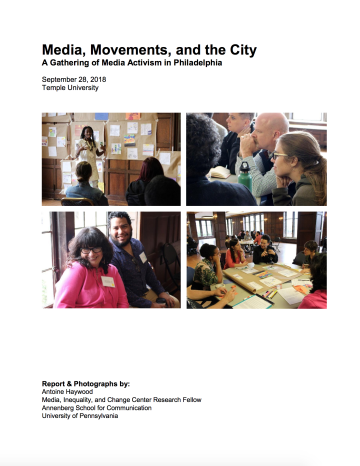
The first Media, Movements, and the City: A Gathering of Media Activism in Philadelphia was a success! Held at Temple University’s Mitten Hall on September 28, 2018, this one-day convening fulfilled its mission, which was to activate a local hub of media makers, activists, artists, and researchers working towards social justice in Philadelphia. This event was the first step toward achieving a larger goal, which is to develop stronger networks of interaction and collaboration in Philly.
The trailblazing Media, Movements, and the City was organized as a result of media activism scholars and practitioners acknowledging a need for a city-wide convening. They successfully managed to leverage their resources to make Media, Movements, and the City come to fruition, which gave Philadelphians invested in media and social change work an opportunity to do groundwork in a big and meaningful way.
Read "Media, Movements, and the City: A Gathering of Media Activism in Philadelphia"
MIC Co-Director publications
In "Democratizing the platforms: Promises and perils of public utility regulation," Victor Pickard discusses the various options for bringing the “extremely commercialized” digital platforms under democratic control and examines their viability.
Read "Democratizing the platforms: Promises and perils of public utility regulation"
Sarah J. Jackson, Moya Bailey, and Brooke Foucault Welles | March 2020

The power of hashtag activism became clear in 2011, when #IranElection served as an organizing tool for Iranians protesting a disputed election and offered a global audience a front-row seat to a nascent revolution. Since then, activists have used a variety of hashtags, including #JusticeForTrayvon, #BlackLivesMatter, #YesAllWomen, and #MeToo to advocate, mobilize, and communicate. In this book, Sarah Jackson, Moya Bailey, and Brooke Foucault Welles explore how and why Twitter has become an important platform for historically disenfranchised populations, including Black Americans, women, and transgender people. They show how marginalized groups, long excluded from elite media spaces, have used Twitter hashtags to advance counternarratives, preempt political spin, and build diverse networks of dissent.
Read "#HashtagActivism: Networks of Race and Gender Justice" for free on MIT Press Direct.
Victor Pickard | December 2019
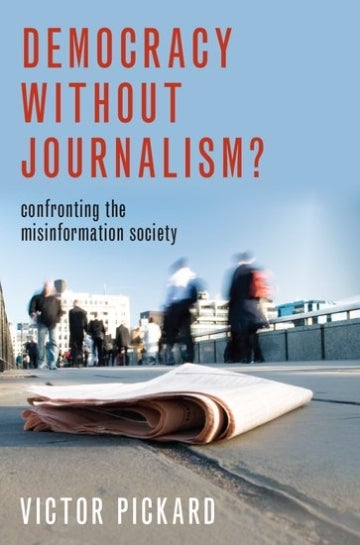
The first scholarly book to historicize the current American journalism crisis and situate it within long-term structural problems that plague the entire commercial news industry.
A timely intervention that brings normative questions about journalism’s democratic imperatives back into focus and proposes structural alternatives to today’s failing commercial news models.
Scrutinizes major transformations in American journalism while offering policy proposals for creating a more democratic media system.
Click here to watch a video of Pickard describing the book.
View "Democracy without Journalism?: Confronting the Misinformation Society"
Victor Pickard and David Elliot Berman | October 2019
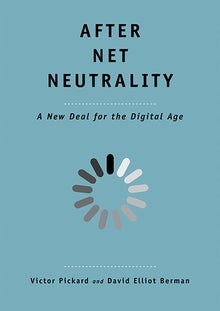
This short book is a provocative analysis of net neutrality and a call to democratize online communication. It functions as both a primer that explains the history and politics of net neutrality and an argument for a more equitable framework for regulating access to the internet. Pickard and Berman argue that we should not see internet service as a commodity but as a public good necessary for sustaining democratic society in the twenty-first century. They aim to reframe the threat to net neutrality as more than a conflict between digital leviathans like Google and internet service providers like Comcast but as part of a much wider project to commercialize the public sphere and undermine the free speech essential for democracy. Readers will come away with a better understanding of the key concepts underpinning the net neutrality battle and rallying points for future action to democratize online communication.
Sarah J. Jackson | December 2018

Shifting understandings and ongoing conversations about race, celebrity, and protest in the twenty-first century call for a closer examination of the evolution of dissent by black celebrities and their reception in the public sphere. This book focuses on the way the mainstream and black press have covered cases of controversial political dissent by African American celebrities from Paul Robeson to Kanye West. Jackson considers the following questions: 1) What unique agency is available to celebrities with racialized identities to present critiques of American culture? 2) How have journalists in both the mainstream and black press limited or facilitated this agency through framing? What does this say about the varying role of journalism in American racial politics? 3) How have framing trends regarding these figures shifted from the mid-twentieth century to the twenty-first century? Through a series of case studies that also includes Eartha Kitt, Sister Souljah, and Mahmoud Abdul-Rauf, Jackson illustrates the shifting public narratives and historical moments that both limit and enable African American celebrities in the wake of making public politicized statements that critique the accepted racial, economic, and military systems in the United States.
Todd Wolfson | December 2014
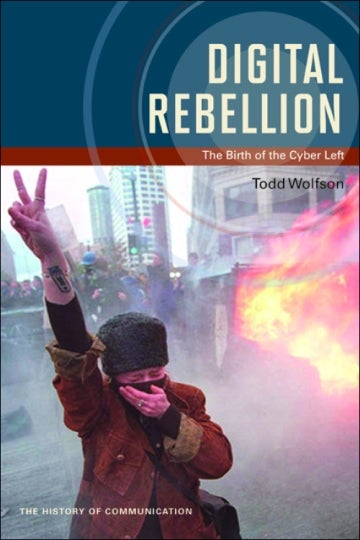
Digital Rebellion examines the impact of new media and communication technologies on the spatial, strategic, and organizational fabric of social movements.
Todd Wolfson begins with the rise of the Zapatistas in the mid-1990s, and how aspects of the movement–network organizational structure, participatory democratic governance, and the use of communication tools as a binding agent–became essential parts of Indymedia and all Cyber Left organizations. From there he uses oral interviews and other rich ethnographic data to chart the media-based think tanks and experiments that continued the Cyber Left’s evolution through the Independent Media Center’s birth around the 1999 WTO protests in Seattle.
After examining the historical antecedents and rise of the global Indymedia network, Wolfson melds virtual and traditional ethnographic practice to explore the Cyber Left’s cultural logic, mapping the social, spatial and communicative structure of the Indymedia network and detailing its operations on the local, national and global level. He also looks at the participatory democracy that governs global social movements and the ways the movement’s twin ideologies, democracy and decentralization, have come into tension, and how what he calls the switchboard of struggle conducts stories of shared struggle from the hyper-local and dispersed worldwide. As Wolfson shows, understanding the intersection of Indymedia and the Global Social Justice Movement illuminates their foundational role in the Occupy struggle, Arab Spring uprising, and the other emergent movements that have in recent years re-energized radical politics.
Victor Pickard | October 2014

How did the American media system become what it is today? Why do American media have so few public interest regulations compared with other democratic nations? How did the system become dominated by a few corporations, and why are structural problems like market failures routinely avoided in media policy discourse? By tracing the answers to many of these questions back to media policy battles in the 1940s, this book explains how this happened and why it matters today. Drawing from extensive archival research, the book uncovers the American media system’s historical roots and normative foundations. It charts the rise and fall of a forgotten media reform movement to recover alternatives and paths not taken. As much about the present and future as it is about the past, the book proposes policies for remaking media based on democratic values for the digital age.

Infographic: Raising the Bar for Journalism
As the business model of for-profit journalism erodes, public-funded media is needed to improve public knowledge and political engagement and lower extreme views. Learn more about public media and how different countries support it.
